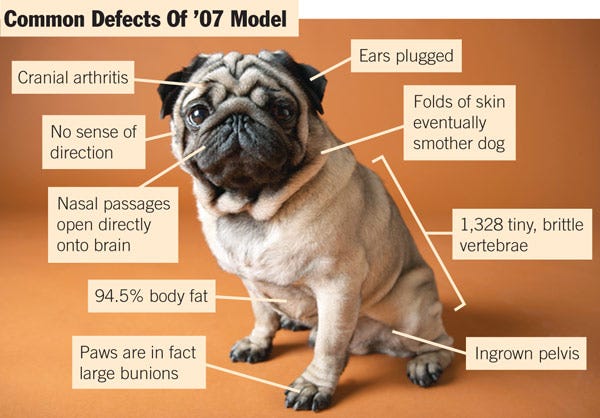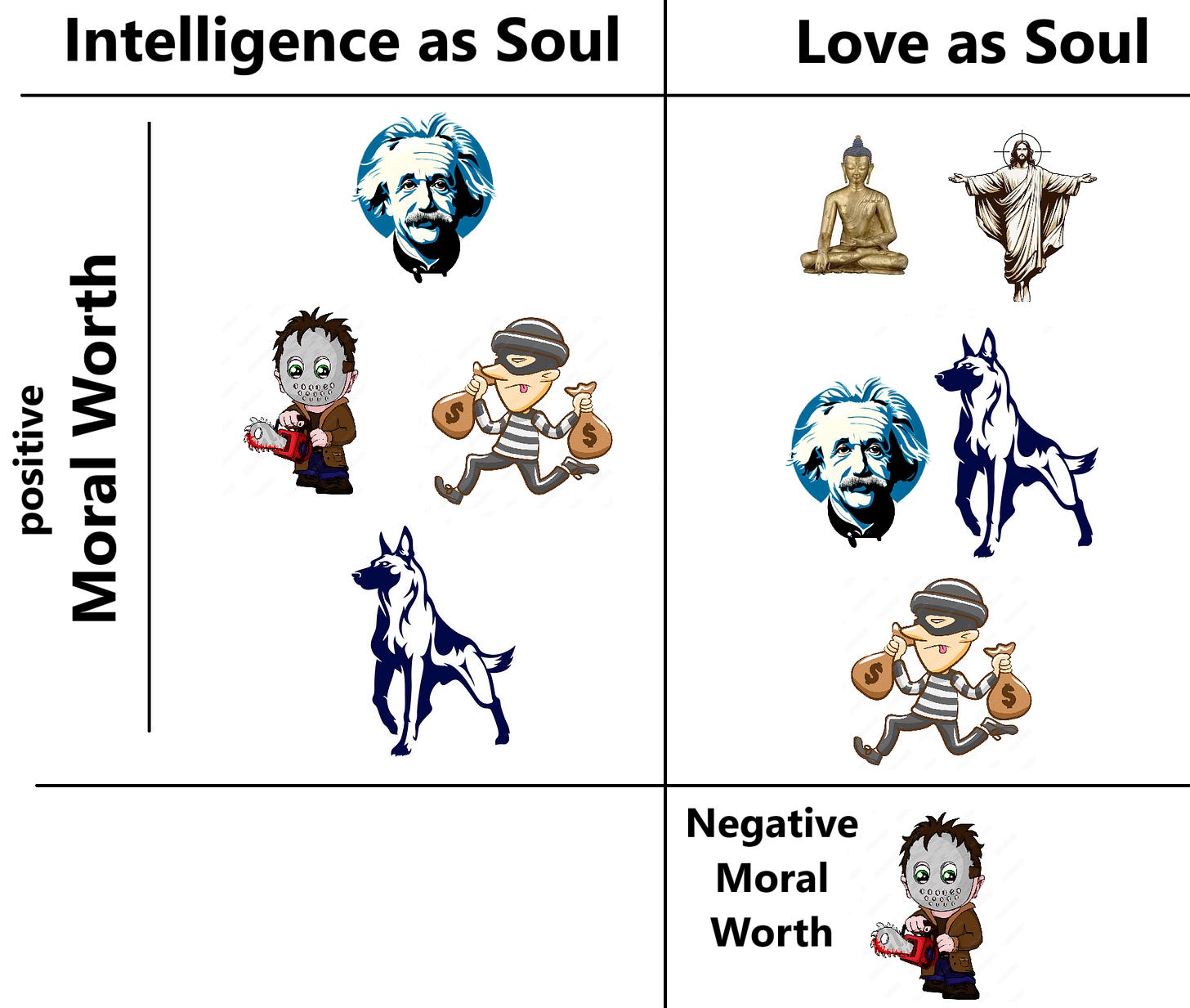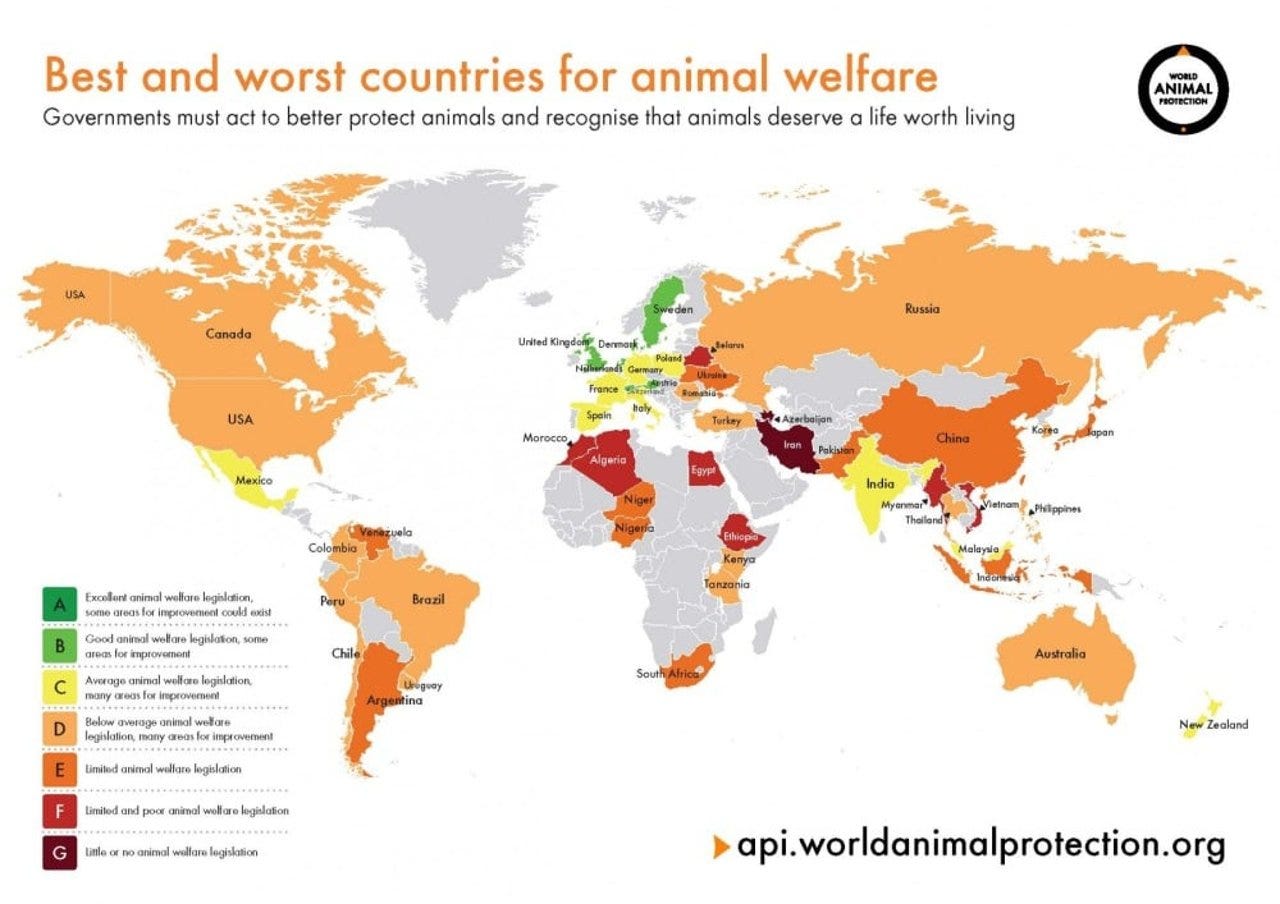In order to find out how important animal welfare is, let’s argue from the inverse, that animals don’t matter at all.
Assume animals do not have souls, and only humans have souls. “Animal pain” is a totally meaningless concept in this view. For example, we could rip a single neuron out of a brain, and hook it up to a single nerve cell, and continuously electrocute it, causing a biological “pain response.” Plants feel this kind of pain. We don’t prevent people from mowing their lawns out of respect for the pain of plants; why care about the pain of animals?
So far, we are making the implicit assumption that all humans have equal souls. But this is a dogmatic and unfounded belief. What if some humans have souls, and others do not? Or, what if some humans have bigger or more refined souls than others? In that case, the suffering of some humans matters more than the suffering of other humans.
If there is a spectrum or hierarchy of souls, rather than absolute spiritual equality, then it is reasonable to assume that animals also exist on this spectrum. At the risk of violating Lewontin’s Fallacy, it seems likely that the difference between humans and animals is smaller than the difference within humans. For example, if the beauty of the soul is determined by heroism, then the gulf between you (dear reader) and a serial killer is much larger than the gulf between you and a dog (or even a cat) which protects a baby.
The doctrine that only humans have souls is only possible when we assume that human souls are all equal. Once that doctrine is scrutinized, the likelihood of animals having souls increases. But how do we determine the value or “size” of souls, when making policy decisions? If it is criminal to torture humans, what should the sentence be for animal suffering?
Let’s say some humans (like you, dear reader), have very big, beautiful souls. Your soul is equivalent to one million small souled humans, who are barely human at all. Then come animals, like dolphins, whales, dogs, cats, elephants, and lions. These animals have smaller souls than the NPC humans, but their souls and suffering matter.
For instance, imagine that the soul of the average human is roughly 10 times more beautiful, complex, or divine than an animal soul. In this case, the lives of 10 dogs, cats, whales, or lions would be about as important as the life of a single human. If that is the case, we need to legally end Sea World, send NATO troops to fight poachers, and devote 10% of our crime-fighting efforts to fighting animal cruelty.
The USA spends $222 billion on policing, which comes out to $663 per person per year. There are 7 million horses in America. If we spent $66 per horse on horse policing (one tenth of what we spend per human), that would be $462 million. But the actual amount spent to enforce the Equine Protection Act is $3 million.1 Instead of treating horses as 6% of a human, or even 0.6% of a human, we are treating them as 0.06% of a human. Personally, I find the sadistic torture of 1,542 horses to be much worse than the torture of a single human.
One problem with enforcement is that horses cannot speak. They do not go to school. If horses are being abused, there are no teachers who can observe signs of trauma and report it to the police. We have no idea how many horses are being abused, or who is abusing them. Inspecting horses on people’s farms could be construed as a violation of private property rights, under libertarian norms. But the state does have the power to tax the sale of horses.
An Equine Sales Tax would reduce the number of horses kept in captivity, which would reduce the overall number of abuses, without requiring on-property inspections. The proceeds of this tax could go towards expanding federal land for the protection of wild horses. Not only would horses benefit from this expansion, but all other animals which need habitat to live free lives. Wolves, eagles, bobcats, and dozens of other species would all simultaneously benefit from the expansion of land.
Freedom as an animal right.
I was listening to a Hanania livestream where he declared that if humanity didn’t have individual freedom, the species would be a moral net negative. I think the freedom of the individual is meaningless without the freedom of the state to protect property, and so the freedom of the state takes precedence over individual freedom. But Hanania’s larger point is correct: a humanity which lacks dignity is not a species worth preserving. Similarly, the enslavement of animals (domestication) is a form of slavery which is an attack on animal dignity. Just as we prosecute human trafficking, we should also consider the harmful effects of animal trafficking.
Freedom isn’t black-or-white, but there are degrees of freedom. Prison abolition is a moral duty, because it is cruel and unusual to place humans in cages for years. It is cowardice to claim that enslaving humans in cages is somehow “kinder” than outright execution. In most cases, I don’t support execution either, but believe that we should provide Cities of Refuge (as proscribed in the Bible), internal exile, external exile, corporal punishment, or Weregild loans in order to fight crime and protect innocent victims. There is no reason to lock people in cages, and it was not historically normal to do so, even among the most bloodthirsty barbarians.
Horse owners argue that their horses are free to roam the farm, and there is no enslavement occurring, but rather a symbiotic relationship between horse and human. I would be more sympathetic to this argument if female horses on commercial farms were not drained of their blood, which is then used to inject into pigs for hormonal stimulation. Horses must be protected from this cruel practice. The pain of female horses decreases the price of pork at the cost of the suffering of innocent mothers. Although these practices don’t occur in America due to farming costs, sanctions should be assessed to the countries involved.
Factory Farming
Americans eat approximately 32.8 billion pounds of chicken per year. Assuming each chicken weighs 5.7lbs, that’s 5.8 billion chickens. But much of the chicken is not eaten by humans, so the real number of chickens slaughtered is closer to 9.3 billion.
We value horses, by law, as less than 1/1,542 of a person. How much do we value chickens?
Let’s assume that the price of free range, organic, cage-free chicken is double that of factory farmed chicken, which is somewhere around $4 per pound. That means banning factory farming would cost $131.2 billion to the American consumer (or tax payer, if we were to subsidize the industry). This means that, per chicken, this would be an additional cost of $14.11.
The organic chicken market is about $3.8 billion out of a total chicken market of $44.6 billion. Assuming that organic chicken is twice as costly as factory farmed chicken, this means only 3.1% of American chickens are raised cage-free. If the price between the two were equal, this would rise to 8.5%.
Since it costs $14.11 to save a chicken’s life from slavery and torture, this means that Americans are collectively saving, at present, between 288 and 791 million chickens per year, out of a total 9.3 billion slaughtered. If we average this extra spending out over all chickens in a “randomized chicken lottery,” this would be like buying a lottery ticket of $0.44 and $1.20 per chicken, with a 3-8% chance of success.
Going back to policing: we spend $663 per human to protect innocents from crime; we spend only $0.43 to protect each horse; we collectively spend between $0.44-$1.20 to protect each chicken. Comparing horses to chickens isn’t fair, because we know that horses are treated much better than factory farmed chickens.
Treating protection of animals as a problem of policing is inaccurate. When a murder has taken place, the state is willing to spend millions of dollars to track down the criminal, gather evidence, and try him or her in a court of law. To truly appreciate how little we value animals, we shouldn’t look at policing (prevention), but civil damages for wrongful death.
In Louisiana, there is a cap put on damages for medical malpractice at $500,000. This is quite small in comparison to the largest payout ever for the wrongful death of a single individual, $150 billion, although that figure also includes injury and suffering for a decade due to life-altering burns. The largest sum provided for wrongful death in a single act was $700 million. When compensatory damages are separated from punitive damages, $300 million has been the largest amount offered for wrongful death.
Another way to quantify the price of human life is to look at the cost to pursue the death penalty, which is $1.26 million. In comparison, the highest award for wrongful death of a dog was $65,000, and the most expensive horse ever sold was for $70 million, and the most expensive chicken is $2,500.
When comparing apples to apples (human policing vs horse policing, chicken compensation vs human compensation), the picture becomes clearer. A human is worth between 4 and 1,542 horses, and between 120,000 and 1.1 million chickens. This isn’t a moral calculation of how things should be, but an assessment of society’s standards de facto.
Currently, it is not legal to defend the life of an animal with deadly force. But if someone attacks a horse, it seems reasonable to defend that animal from attack. Even more so, if someone is torturing an animal, we have a moral duty to stop that torture. If someone is electrocuting a horse, or a chicken, or any other animal, the state has a moral duty to intervene.
Here’s the same chart as before, with three slight adjustments:
In the first adjustment, protections for horses have been expanded 10x. This means increasing the Equine Sales Tax from 6% to 50% to reduce the number of horses bought and sold in captivity; using those funds to expand federal lands for wild horses (and other animals); and passing tariffs against countries with practice vampirism against female horses. These protections would be equivalent to valuing a horse as 1/154th of a human. Still not optimal, but an improvement.
In the second adjustment, factory farmers are assessed a regulatory fine of $14.11 per chicken, which would eliminate the practice entirely. All chickens would be free range and cage free as a result. This equates the life of a human with the lives of 35,436 chickens.
In the third adjustment, the penalty for cruelty to chickens has been increased from $2,500 to $25,000. This is already the fine associated with cockfighting in Oklahoma, but would be applied equally to factory farming practices.
Canine Captivity
If someone ties up a dog in their front yard, and doesn’t feed the dog, and it is covered in fleas and sores, we should prosecute this person in the same way that we would prosecute a parent for tying up a baby, not feeding the baby, allowing it to become covered in fleas and sores. Maybe not to the same extent, but in the same way.
Imagine if you walked by someone’s front yard, and saw men with collars around their necks, tied to trees. Or imagine if the men were put in cages, crying and screaming. You would call the police. Similarly, people who keep barking animals in cages, leashed all day, should be prosecuted.
Dog owners who keep their dogs inside all day, and do not walk their dogs, are committing a crime against the freedom and dignity of canines.
Dogs are a domesticated form of wolves, and the proper form of reparations to canines for the crime of undignified domestication should be to ban or tax breeds which are congenitally unhealthy.
Similar to the Equine Sales Tax, dog owners should be assessed a tax in accordance with the poor health of the breed, up to 50% of the value of the dog in the case of pugs. The proceeds would then be used to expand federal lands and protections for wolves. Wolf hunters, like those who fly around in helicopters gunning down wolves, should be aggressively prosecuted. Ursula von der Leyen must resign for her crimes against wolves.
Are animals worth less than humans?
So far, we are assuming that moral worth, or “soul,” is roughly parallel in magnitude or value to “intelligence” or “economic capability.” But this could be inaccurate. Intelligence, or the ability to think abstractly, to calculate, to predict the future, is not necessarily equivalent to moral worth, nobility, or the value of the soul. A highly intelligent species could have negative moral worth if it was, by its nature, loveless and parasitic.
The function of the soul is not to calculate, but to love. To love means to sacrifice one’s own life for one’s friends. I can think of no higher love. Dogs have demonstrated their willingness to die for their owners. And yet, many humans, when confronted with fear, trample others in a crowd, thinking only of themselves. Serial killers abuse others for their own sick pleasure. Is it possible that some dogs have a greater moral worth than some humans?
Previously, we considered the possibility that some animals might have souls, lesser in value to humans. Now, we consider the possibility that some animals have greater souls than humans, not as a result of intelligence, but from their ability to sacrifice their lives out of pure love.
It is difficult to imagine that a human soul exists if it is a mere measurement of calculative ability. In that case, a $50 iPhone seems to have a greater soul than many humans, and we should value the death of all humans around $400 billion. If it were possible to enslave humans and force them to create more iPhones, this would be a net positive, since it would increase the total “soul quantity” in the world.
Or, let’s say we don’t define moral worth by intelligence, but by economic capability. In this view, animals and iPhones aren’t “independently economically capable” in the way that humans are. They are only tools to be used by humans.
By this standard, old people, the mentally handicapped, the disabled, the unemployed, refugees, and other “useless eaters” are a net drain on the global economy, and allowing them all to die would allow for greater production of iPhones. By saving $1.244 trillion on Social Security, we could build 25 billion iPhones.
Maybe you’re not convinced that an iPhone is truly more intelligent than the average human. But a supercomputer is more intelligent than a mentally handicapped person, at least in terms of sheer calculative ability. Computers have been able to score 150 on IQ tests since 2012, which is much smarter than 99% of people.

Perhaps intelligence cannot be measured by IQ tests. Humans are much better than computers at navigating physical spaces; they have emotions; they are willful. In terms of physical, social, and emotional intelligence, iPhones cannot compete with humans. But animals have emotions; animals are athletic and can navigate across thousands of miles; animals are willful, sexual, and loving.
My point is that you can only have it one way or the other: either iPhones have greater soul value than disabled humans, or animals have greater value than cruel, sadistic, and abusive humans. We have a moral duty to stop animal cruelty, even if that means using the force of the state to protect the lives of animals.
Conclusion.
This is a very depressing map. Britain and Sweden are in bright green, but neither country has banned factory farming.
America should be the moral leader of the world. A humanity which abuses, tortures, and torments animals does not deserve to exist. In this sense, the abuse of animals is an existential crisis.
The Green Party in Britain and the Green Party in Germany have both promised to ban factory farming. It could be argued that the philosophy of the Green Party is anti-western and anti-growth, and for this reason, its ideology also poses an existential threat to humanity. But opposition to factory farming does not necessarily need to be paired with other disastrous policies, like open borders and nuclear disarmament. It is possible to support strong economic growth, and oppose open borders, while also supporting animal welfare.
Unfortunately, (partially due to Russian propaganda efforts which have supported European green parties since the Cold War) animal welfare has been irrationally intertwined with anti-western and anti-growth ideologies. For example, if someone is opposed to factory farming, they are also likely to oppose carbon emissions. But these two positions are not logically dependent on one another. Global warming is not nearly as destructive to animal welfare as factory farming.
The soul of a human, or an animal, is not harmed in death, but only in torture and suffering. Death is a certainty, and cannot be avoided by any means. The fear of death is a cause of suffering. Global warming does threaten the sensitive habitat of many obscure Arctic species, but it will also lead to the rise of new desert habitats and new desert species. Life finds a way. Humans, in changing the climate, are a force of nature. We cannot compare, in moral terms, the intentional torture of animals to a shift in global temperature. This sort of blind utilitarianism ignores the importance of moral intentionality and the immanent experience of love (or its absence).
Climate change is an inevitable part of nature; humans are a part of nature; carbon dioxide is a part of nature. There is no reason to oppose climate change on spiritual grounds. While some species may go extinct, this part of a natural cycle of death and rebirth which has been occurring for millions of years. What is not inevitable is the torture, enslavement, mistreatment, and torment of animals. There is no reason why we need to trap animals in cages, suck out their living blood, electrocute them, cut off their beaks, clip their wings, main them, abuse them, kick them, force them into crowded concentration camps, fill their nostrils with feces and ammonia, or cause them any suffering at all. In fact, the state has a moral duty to declare war on these conditions, as much as the state has a duty to protect widows, orphans, and victims of crime.
The consumption of animal meat is a natural process which only requires a brief period of pain during slaughter. By contrast, factory farming involves stuffing animals full of unnatural hormones; breeding them to be hyper-obese and unable to move; forcing them to live for years covered in feces, while feeding them antibiotics to keep them alive. The force and compulsion of the state is morally necessary in order to oppose these atrocities.
In practical terms, the overuse of antibiotics also helps breed antibiotic resistant diseases. These are unlikely to spread to humans, but the chance is always there. Would it be divine justice if humans accidentally engineered a pandemic as a result of our cruel factory farming practices? It would be a taste of our own medicine.2
The BLM spends much more on horses, $137.1 million, but this is dedicated to wild horses, not protecting domesticated horses from abuse.











Our level of consideration for others' well-being obviously doesn't come from an objective consideration of either their 'intelligence' or 'love'. Imagine how a life form like that would behave. If it somehow could evolve, it would immediately go extinct. There are multiple considerations involved, but the most important is our assessment of their value as friends (or danger as enemies). That's why we care a lot more about people we know personally than about random strangers. They can more easily help or hurt us, so better be nice. This is the reason for the difference in our treatment of humans and animals,
not some Platonic nonsense about their 'soul value'. If you want to live in a society of humans, you have to treat human interests particularly carefully. Animal interests, not so much. Alternately, you could say that that the phrase just refers to the intuitive perception, leading to a tendency to act this way, with which evolution, a providential if unmerciful god, has outfitted us. If AI ever develops the ability to significantly affect the material world, it wouldn't surprise me if humans suddenly develop the same overriding interest in their welfare. And if not, the ones who don't will just go extinct as well. So it goes.
My soul is simply too decrepit to truly care about animals. But there is a good argument I have seen to treat animals with dignity that works even for me: AI will learn to how think and behave from us, if it sees we continue to enslave or kill « inferior » animals then AI will kill or enslave us as we definitely would become inferior to it at some point. If we treat those inferior animals with dignity, then the AI might also decide to treat us well , especially since we would be closer to being the « good guys » in this case.